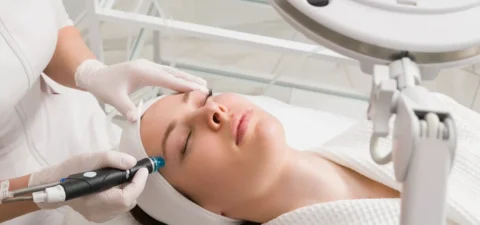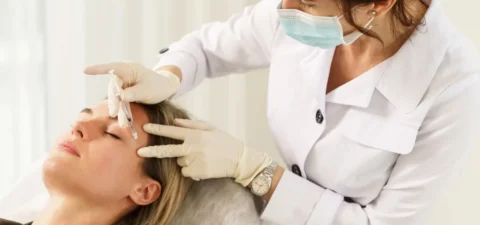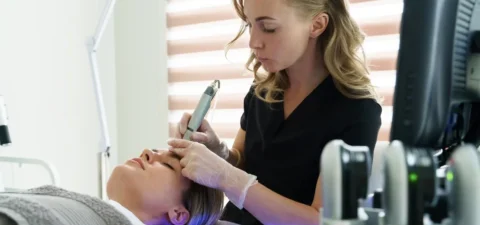Please read the disclaimer at the bottom of this article after you finish reading.
Opening a med spa has become more common across the United States. Between the advancements in cosmetic procedures and the involvement of medical practice, medical spa services have become a booming industry. However, one particular area that potential business owners can find difficulty with is the exact regulations that a state has about opening a med spa.
So what’s it like to open a med spa business in Georgia? Like many states, Georgia has strict laws on who can own, operate, and administer specific cosmetic treatments at a medical spa. But with the help of a medical professional (and a healthcare attorney), you can reasonably open your own medical spa with the following information below.
How to Get Started With Your Own Medical Spa
There are several legal, business, and staffing concerns that every med spa owner should be able to answer before operating a medical spa. These considerations aren’t always specific to the state of Georgia, but are instead good foundational steps to keep in mind for starting a medical spa in general:
1. Trademarking Your Brand
One of the first (and most important things) that legal experts often advise potential medical spa owners is to define their brand so they can trademark it as early as possible. This isn’t just to make yourself distinctive or to make marketing easier: it’s also the legal entity to which your business will be recognized in the state.
Here’s some advice from the experts on how you can trademark your medical spa:
- Be simple and memorable. You don’t need to necessarily include “medical spa” or even mention that you provide these types of services in your brand. A good example to think about would be tech giants like Google or brands like Zara: simple, memorable, and straight to the point.
- Ensure that it’s not infringing on anyone else’s trademark. With so many medical spas being made, it can be easy to come up with a name or a brand that’s already similar to other med spas. You’ll need to do your research to make sure that you aren’t violating any trademarks.
- Partner with a professional. Healthcare attorneys and law firms are especially useful with trademarking your medspa since they already have experience with helping other similar practices with their legal concerns. One good resource to consult is the American Med Spa Association.
The trademark is arguably what makes the rest of your business plan possible, from marketing to the services and products that you’ll offer. Keep in mind that this isn’t always set in stone and your medspa can change over time – what’s important is that you have a firm idea of what you’ll be when you start out.
2. Setting Up Your Medical Spa
Medical spas can require a lot of products, equipment, and other fixtures before they’re allowed to operate. In most states, you’ll need to consult with your local zoning board before you can even pick a location. Georgia doesn’t have any specific rules about the physical setup of your medical spa, but you will still be subject to local regulations when building a commercial structure.
Here are some useful things you can keep in mind:
- Make sure you have the essential equipment. A treatment chair, enough room for your stocks, and other medical tools and supplies are all essential to the daily operations of a medical spa. Be especially careful about your fridge where you keep products like Botox: some regulations may require you to keep it at a specific temperature/and or make sure it locks.
- Lighting is extremely important. Lighting can often be underlooked when it comes to setting up a med spa – but it’s a crucial feature of your premises that allows you to give better service. Consistent lighting around your medical spa gives your staff a better view of your patients and helps with clearer before and after photos.
- Ensure you only have as much equipment as you need. While it may be tempting to stock up on as much product as you can, experts generally recommend just going with what you need to actually administer your treatments safely and efficiently every day. There’s plenty of time to upgrade and get better equipment later.
Setting up your medspa properly helps direct the flow of foot traffic, makes the overall client experience better, and conforms to the local zoning regulations that you’ll need to follow. Keeping track of these little things can drastically make a long-term difference in the standard of care you can provide.
3. Hiring The Right Staff
Your staff is arguably one of the most important parts of your med spa. It doesn’t matter whether or not you have a medical license – as a med spa owner, it falls on you to make the proper hiring decisions and make sure that the people who are working for you are happy where they are.
Some ways you can improve your staff include:
- Creating the right culture in the workplace for them. It’s important to be as accommodating as possible when you’re building such a close-knit team of medical professionals. Because their disciplines – and treatments – will often intersect with one another, choosing staff that fit into your workplace culture will make treatments more efficient.
- Training regularly and continuing education. Cosmetic medicine is always looking to advance current treatments and innovate entirely new methods of making patients look better. Always make sure to allot the time and budget to allow your staff to train in their disciplines and get better at what they do. This also helps your medspa remain compliant with state regulations.
- Ensuring smooth and consistent compensation. Organizing your payroll and making sure everyone gets paid what they’re worth and on time is a great way to retain your staff long-term. Considering that the demand for medical spa services may increase as more treatments become widely available, you’ll still be able to pay your staff well while also gaining profit.
Long-term retention of staff doesn’t just cut costs: it also improves patient confidence and trust in your med spa. Clients often prefer to work with a provider long-term, since they can rest easy that the medical professional assigned to their treatments already knows what’s best for them.
Some Considerations for Georgia Med Spas
What are some specific regulations that med spa owners may have some trouble with in Georgia? Here are two cases you should be careful about:
1. Medical Spa Services as Medical Procedures
Aesthetic treatments like Botox or dermal fillers may not seem like “true” medical treatments, Georgia law states that these treatments count as medical services. Body sculpting services also count as “practice of medicine” procedures, even if they’re non-invasive and require little to no medical treatment at all.
What does this mean for med spa owners? In particular:
- A licensed physician must personally perform these types of treatments
- A licensed physician can personally supervise another trained professional to do the procedure
- A licensed physician may delegate to a mid-level trained professional to perform this procedure
It’s not enough for an esthetician to perform aesthetic medicine treatments in Georgia. If the procedure is counted as a “practice of medicine”, only physicians or a medical doctor can administer the procedure. Failing that, physician supervision must be personally on site during the treatment.
2. Employing Delegating Physicians
Closely linked to the above concern is the potential conflict of interest if the owner of a medical spa employs a physician who can technically delegate any procedures to them. There are strict rules against this: for example, an advanced practice registered nurse can’t be the owner of a med spa and hire a physician to delegate treatments to them.
Specifically, the following points should be taken into consideration:
- A nurse practitioner who owns a med spa can’t hire a physician who will supervise them
- This ban also covers any independent contractors or physicians that are not your staff full-time
- The language specifically states “hiring”, not merely “employing” physicians
Given that physicians are often the medical directors of medical spas, this can be a grey area that many medspa owners may unknowingly violate. As a business owner – whether or not you have a medical license – the safest thing to do to avoid violations is to not be involved with the medical aspect of your business at all.
FACE Med Store: Your Supplier Of Medical Grade Supplies And Equipment
A medical spa owner should carefully consider the state regulations about the medical spa industry before they open their medspa. More importantly, they should also keep up to date with any changes to the law even after they’ve started operations. Even in lenient states like Georgia, there’s always the chance that the rules will be changed to stricter requirements.
FACE Med Store has been a reliable partner of cosmetic and medical practices across the country, supplying our clients with medical-grade tools and equipment at competitive prices. Our stocks are now open to the general public as well, helping both patients and providers keep up a high standard of care no matter their needs.
For more information about us and our stocks, visit our website today.
Disclaimer:
The information and answers contained in this article provide a general guide to certain laws that apply to “medical spas” and cosmetic medical treatment in this particular state. The information on this site is for general reference only and its accuracy cannot be guaranteed as medical spa legalities and regulations change very frequently. This information is not intended to provide legal advice, and it should not be relied upon as legal advice. This information is not intended to create, and receipt of it does not constitute an attorney-client relationship. To our readers: You should not act upon this information without seeking knowledgeable legal counsel that takes the laws of your jurisdiction into account.






